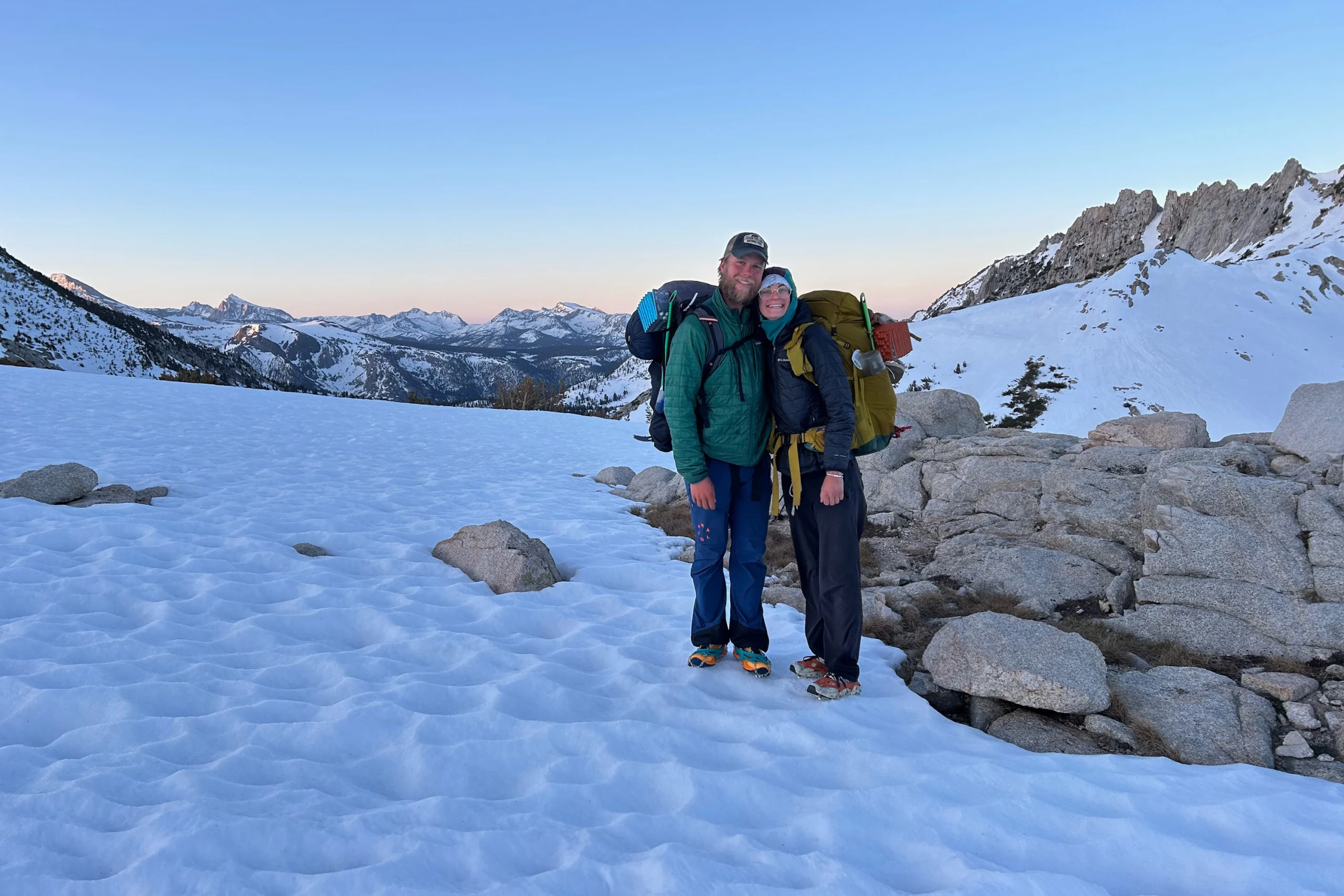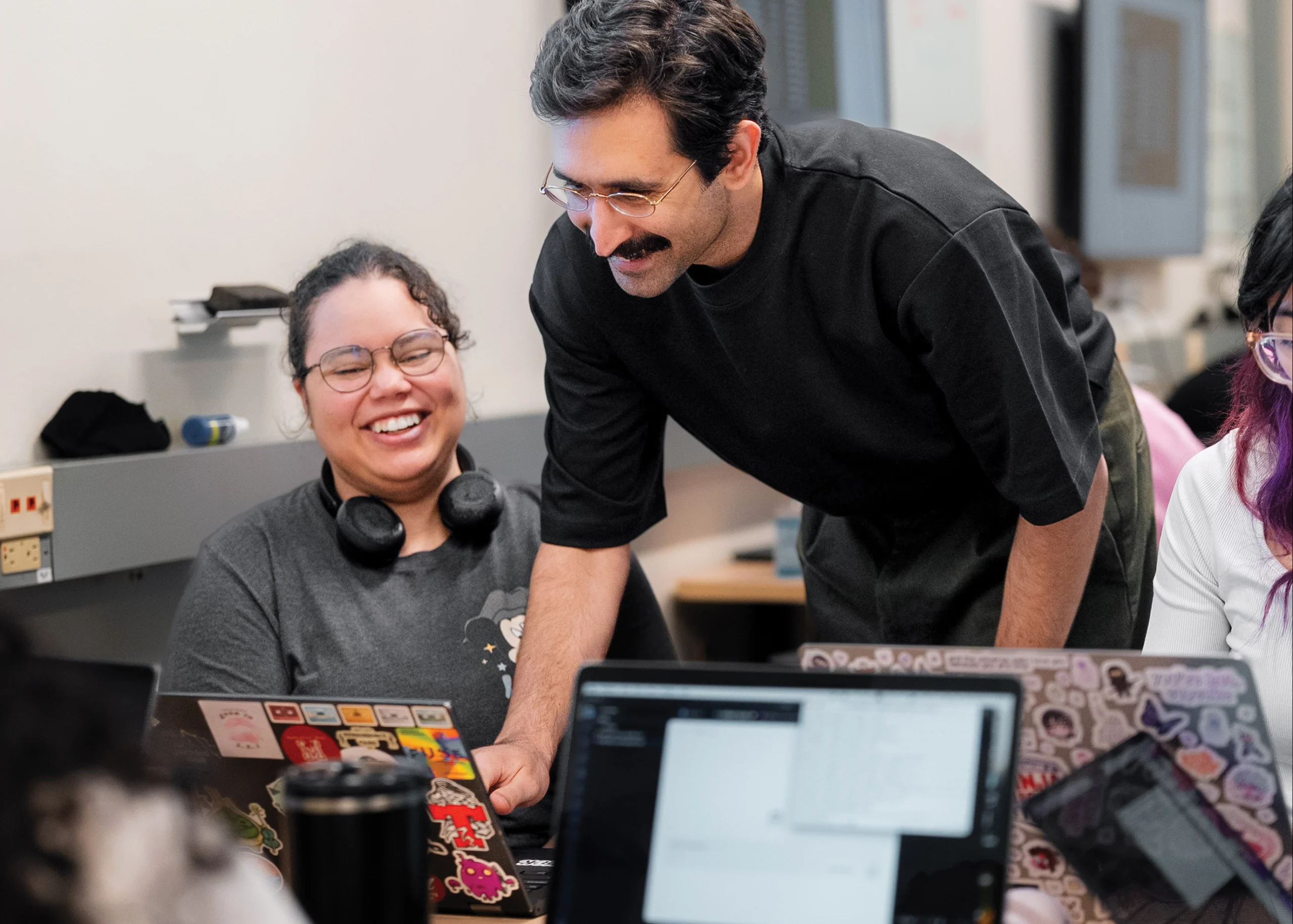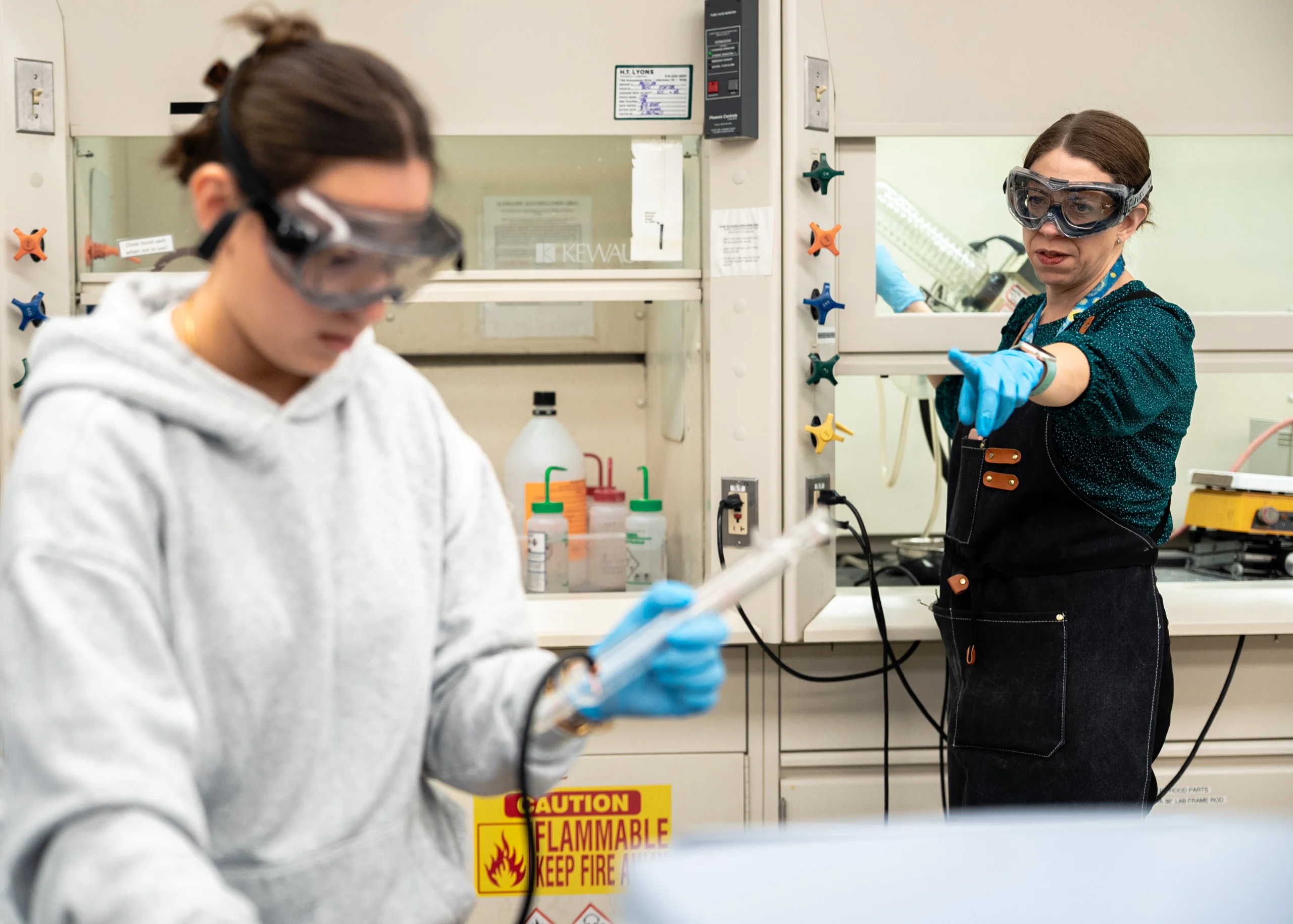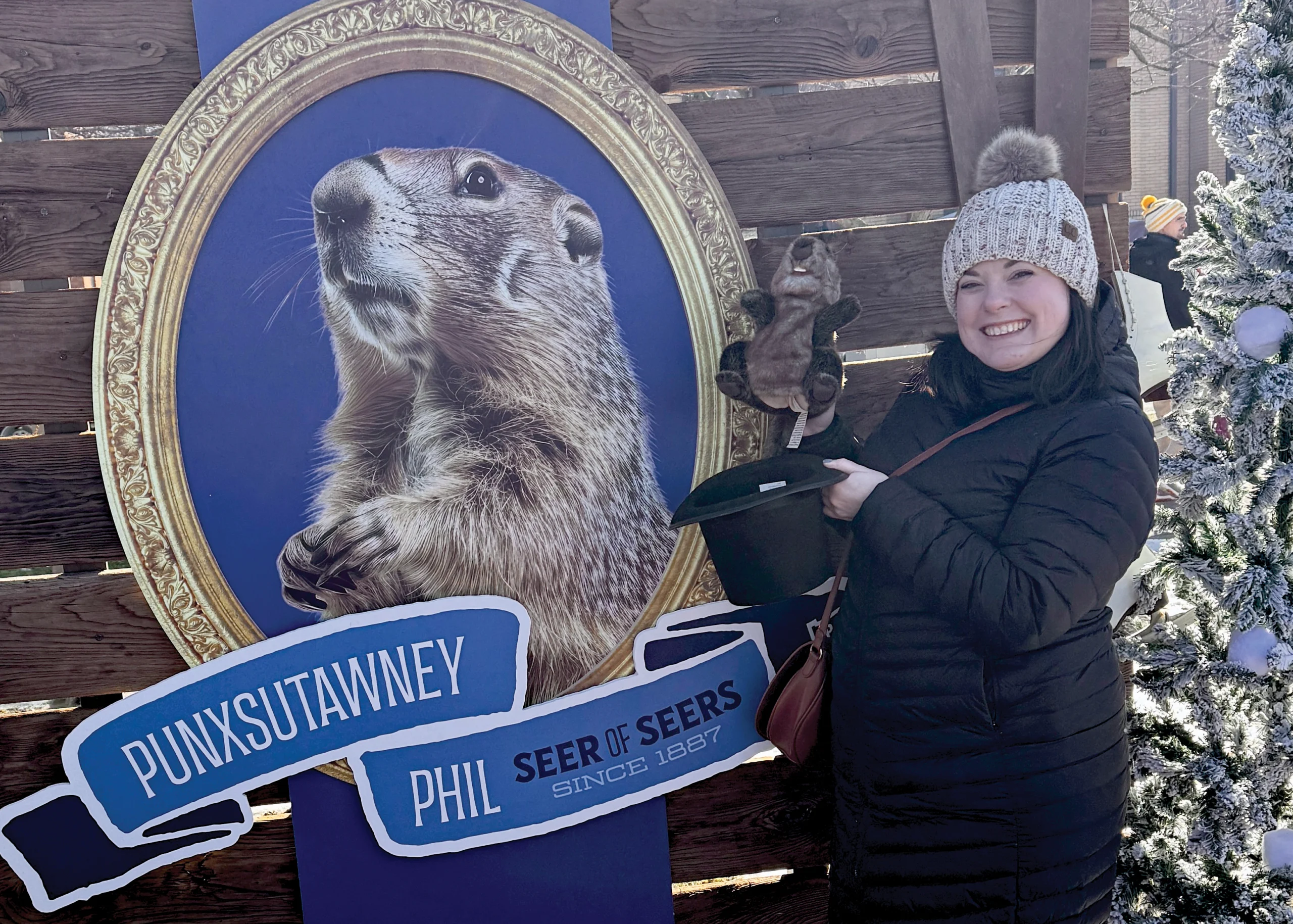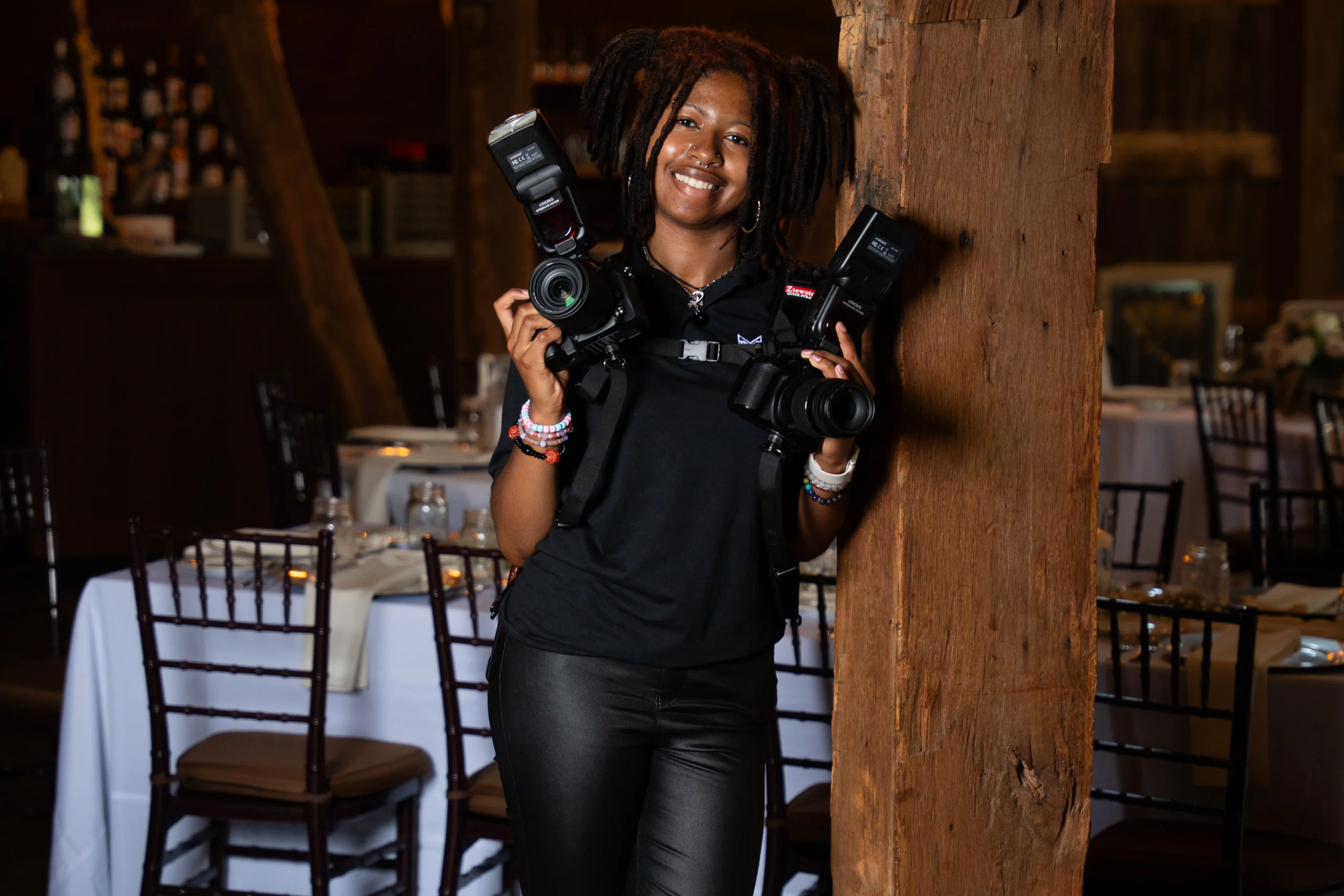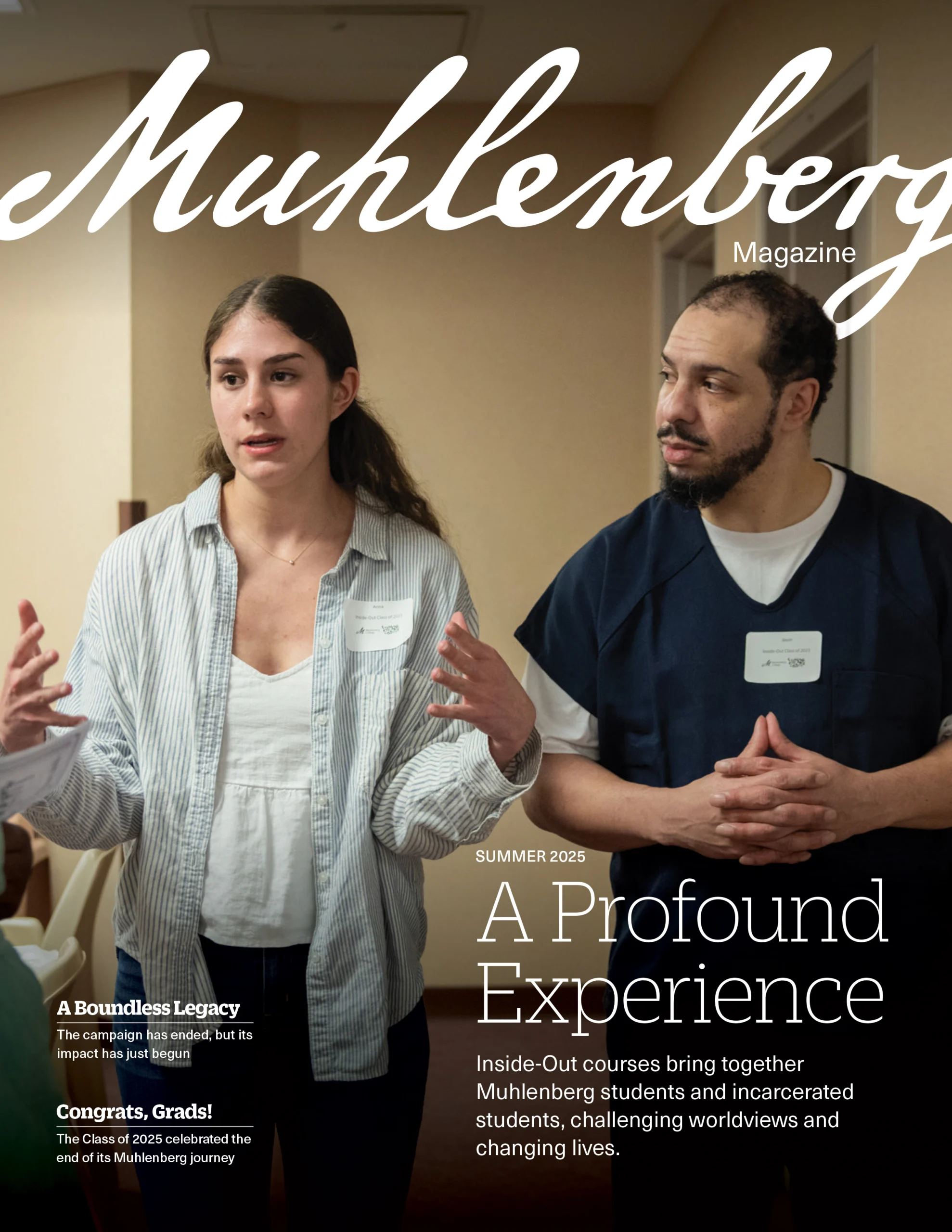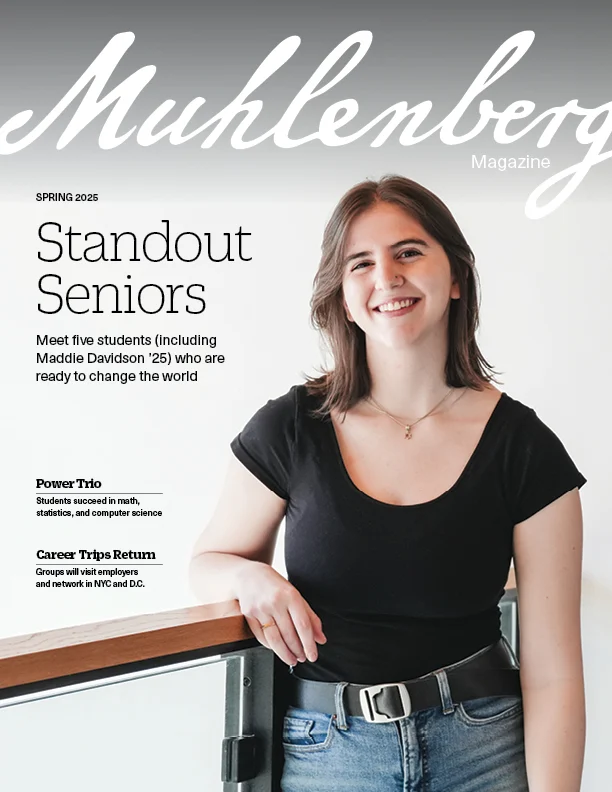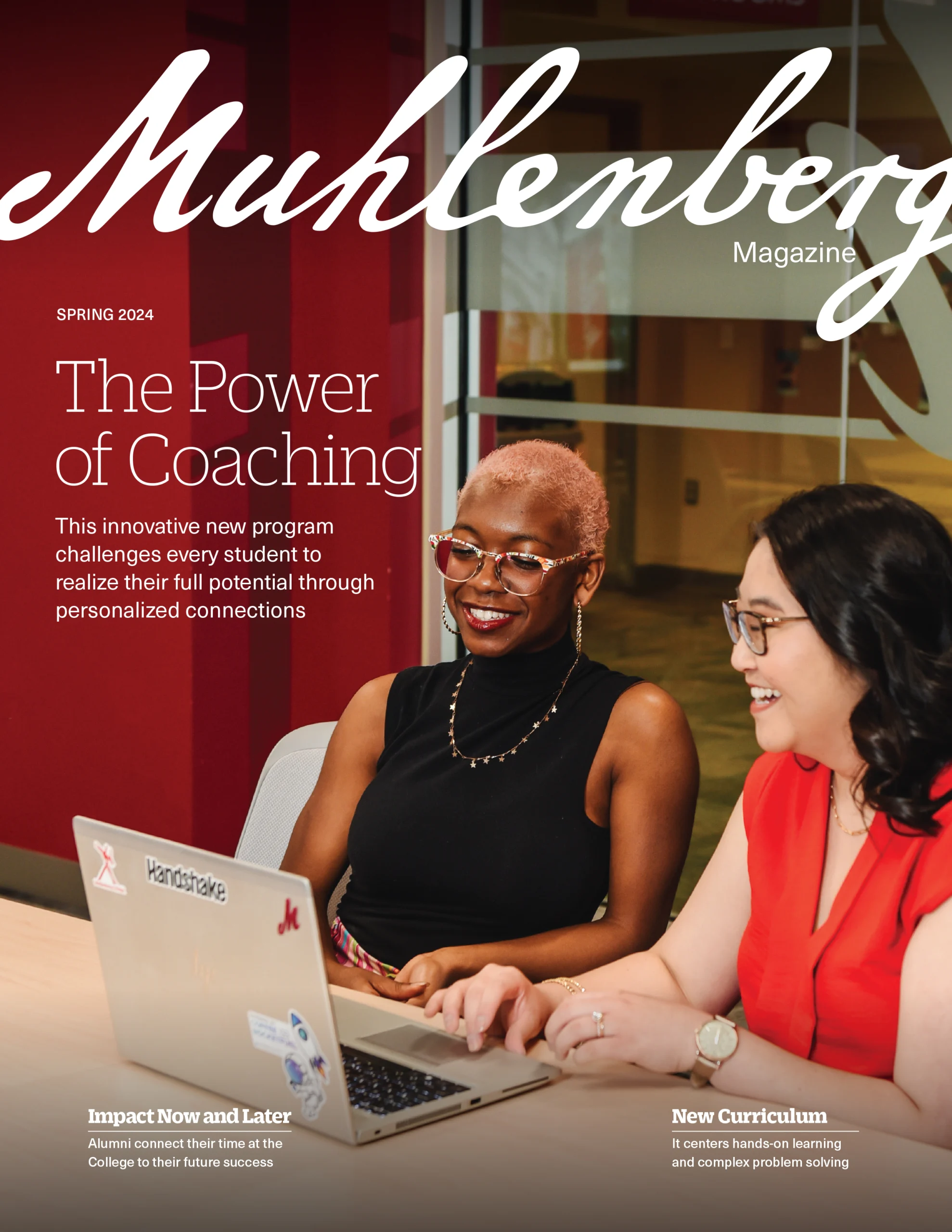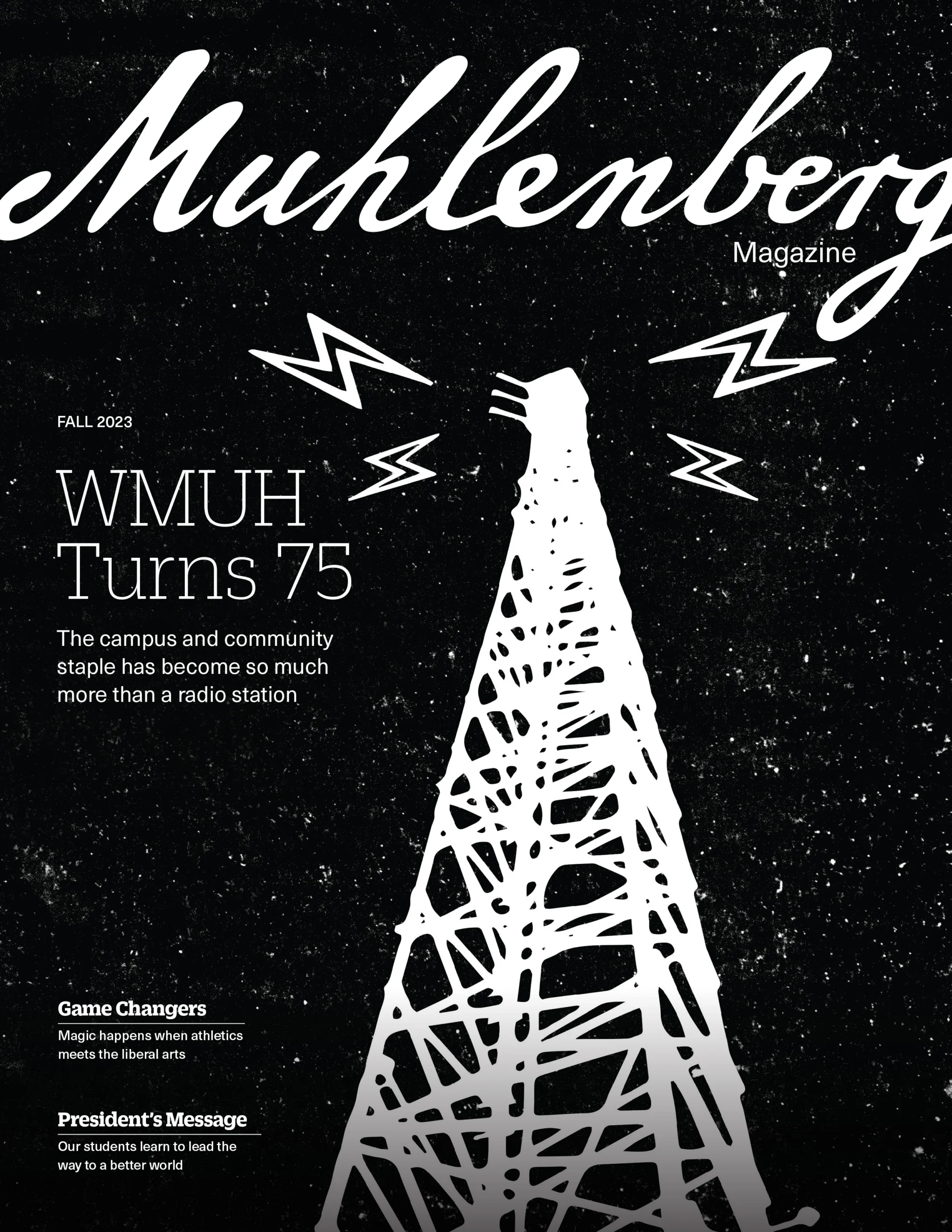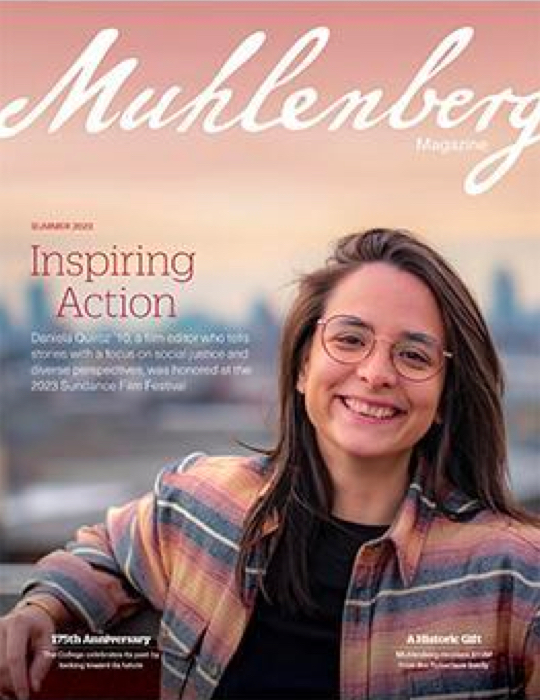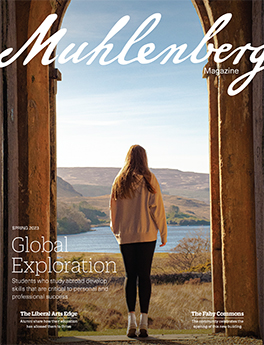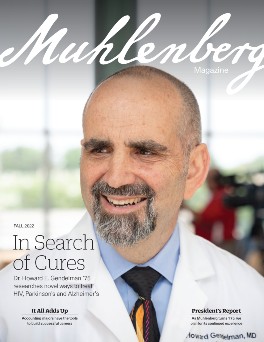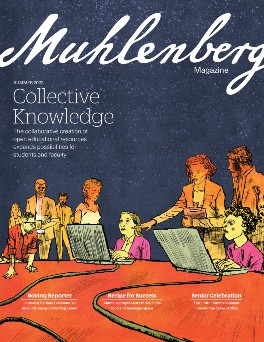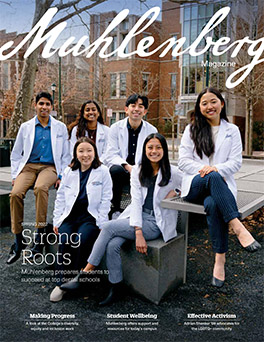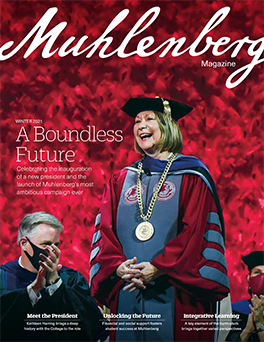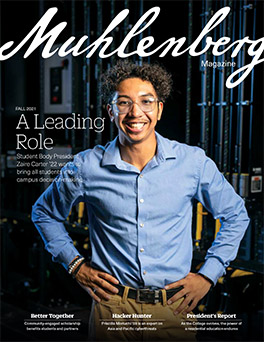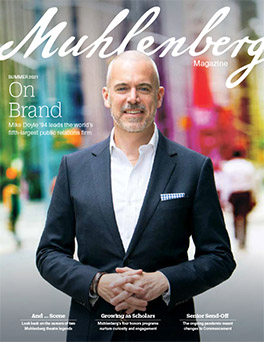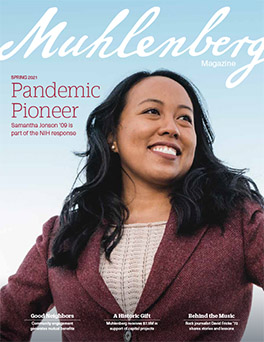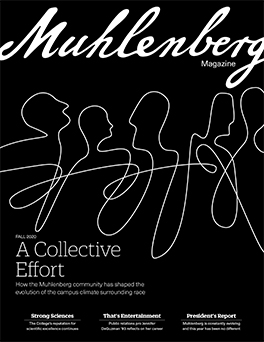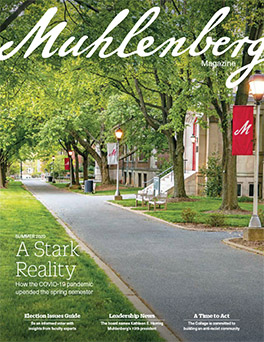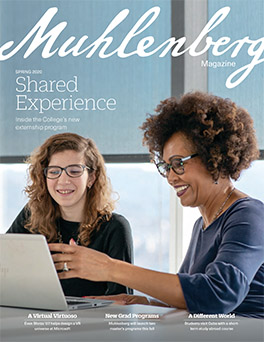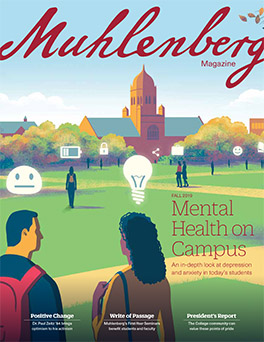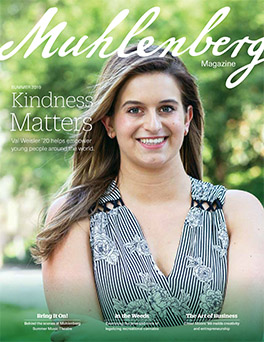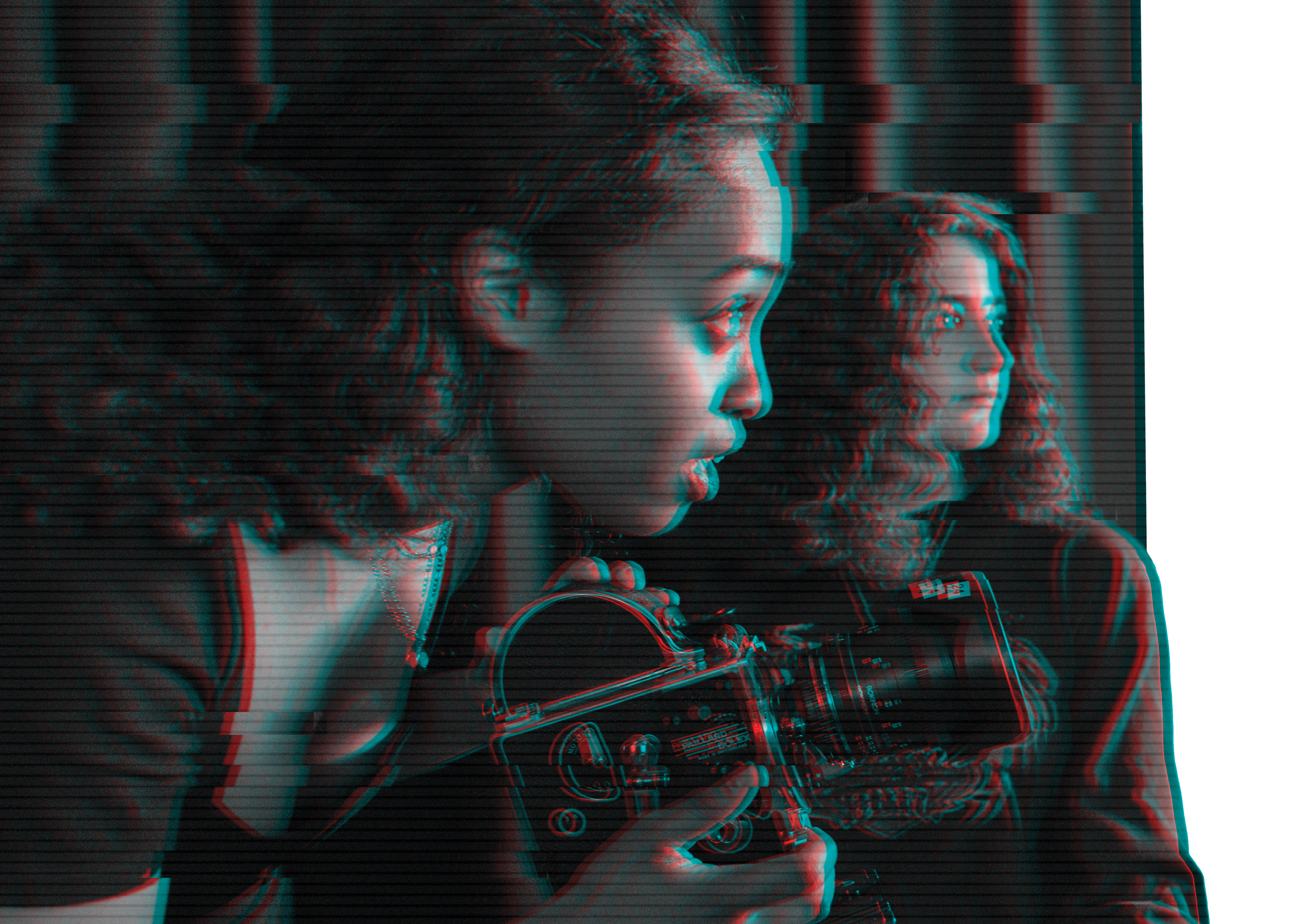
Media Comm at Muhlenberg
The media & communication department challenges students to blend theory and practice and supports them as they learn not only how to make media but how to do so ethically. The unique skill set that Muhlenberg fosters in students, and the connections the College helps forge between current students and alumni, allow media & communication graduates to thrive in a constantly evolving field.
Mayu Lee ’24 and Sophie Stein ’25 in Cinematography in spring 2023. Photo by Lisa Helfert
Media & communication is the third most popular major at Muhlenberg, and with good reason. It’s a distinctive program, says Professor and Chair of Media & Communication Paul McEwan, in three important ways.
First, among the relatively small number of liberal arts colleges that offer communication programs, no other has one with the number of faculty (11) and the breadth of faculty interests that Muhlenberg has. Current faculty include the author of a book on podcasting (Professor of Media & Communication John Sullivan), a scholar of representations of femininity in popular culture (Professor of Media & Communication Elizabeth Nathanson) and the recipient of a Sundance grant for documentary filmmaking (Assistant Professor of Film Studies David Romberg), to name a few.
Second, Muhlenberg’s Department of Media & Communication offers a blend of theory and practice. Peer liberal arts institutions with communication programs tend to skew toward theory, McEwan says, while larger research universities’ programs focus on practice. At Muhlenberg, all students experience the media studies side of the discipline and are expected to make things — short films, reported articles, websites and so on — as part of their coursework.
Third, and perhaps most importantly, Muhlenberg’s media & communication program builds in a commitment to social justice and ethical media-making.
“There is an unfortunate trend sometimes in communication programs in America, where they teach students how to talk in front of a camera, but there’s very little about what comes out of your mouth. The last thing that the country or the world needs is people with cameras and an underdeveloped sense of ethics,” McEwan says. “It’s baked into our program at every step to think about what the responsibility is in telling other people’s stories. Our students and our graduates are well aware that there are no simple answers to those questions.”
Indeed, media & communication at Muhlenberg reflects the College’s mission to develop independent critical thinkers who are committed to understanding the diversity of the human experience, able to express ideas with clarity and grace, and equipped with ethical and civic values.
“Muhlenberg’s media & communication program stands out not only for its academic rigor but also for the way it empowers students to combine critical thinking and ethics with creative practice,” says Provost Laura Furge. “The faculty are leaders in their respective fields — scholars, authors and creators who bring cutting-edge research into the classroom. Due to the intentional mentoring and hands-on learning that occurs with a nationally recognized faculty, our graduates leave with the tools to shape media responsibly and ethically in a world that deeply needs those skills.”
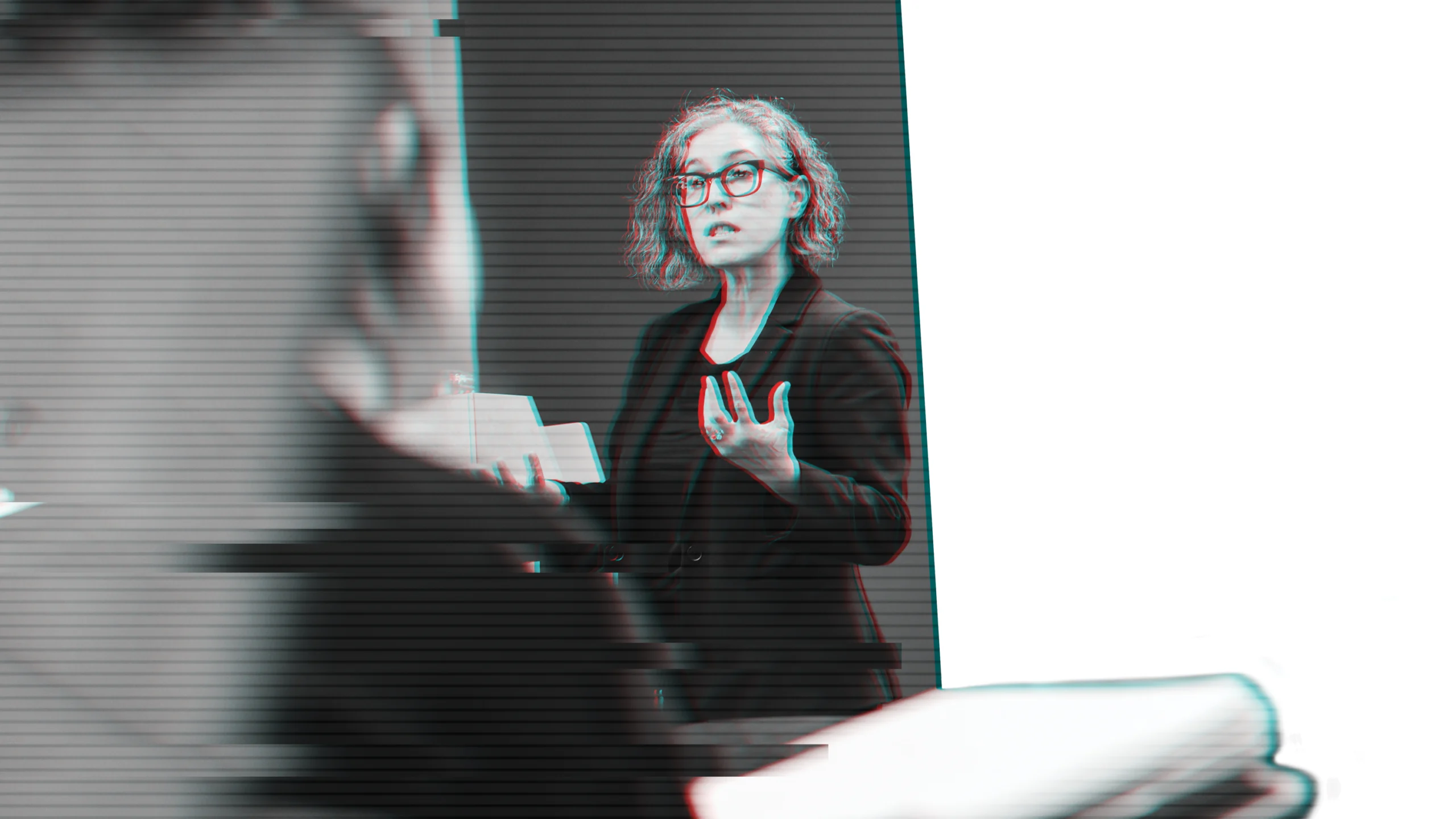
“Our graduates leave
with the tools to shape
media responsibly
and ethically in a
world that deeply
needs those skills.”
—Laura Furge, provost
Lecturer of Media & Communication Sara Vigneri teaching Journalistic Traditions in fall 2023. Photo by Lisa Helfert

A Future-Facing Curriculum
The media & communication curriculum is built on four courses all majors must take. Media & Society serves as an introductionto media studies, or the theoretical side of the discipline. Documentary Research blends theory and practice as students consider the relationship between a filmmaker and the stories they’re telling and learn to produce a short documentary about a subject of their choosing.
“The content of the class is all about tricky cases of people deciding to tell someone else’s story, often with the best of intentions, and it doesn’t work out very well. It’s about what that means, how you can grapple with that and how you can see yourself and your relationship to others,” McEwan says. “We really want to set that up so that it carries through the rest of students’ media-making lives and they approach things cautiously and with care forever.”
Then, the course Media Theory & Methods introduces more advanced media studies concepts to set students up for their senior-year course, Ways of Seeing. Nathanson, who was department chair when this course became the required culmination for all majors, says that each week, students learn a media-making process and explore ways to unpack that process using the critical thinking skills they developed as majors.
“It’s explicitly organized around blending theory and practice,” she says, “so that all students have the opportunity to reflect back on their experience as comm majors through a course that teaches them new skills in how to make different types of media but also expects that they have the critical literacy, and builds on and celebrates that critical literacy, as they are developing those skills.”
Beyond this core curriculum, students have opportunities to pursue their interests across the media landscape. Courses like Feminist Media Studies, Children and Communication, Media Industries, Race and Representation, and Global Media allow students to study the history of media representations and industries. Muhlenberg also offers courses in podcasting and audio production, television and film, video production, interactive web design, health communication, and media advocacy, among many others. And because the media landscape is constantly changing, new courses are being introduced all the time. Newer courses include Comics Journalism and Environmental Journalism.
Still, the foundational courses required of media & communication majors set students up to succeed, even in emerging media. McEwan remembers an alum from more than a decade ago who returned to campus shortly after graduation and said, “I work for this company that makes this little stick, and it goes in the back of your TV and it connects to the internet.” The company was Roku, though barely anyone, on campus or off, had heard of it at the time.
“Students get this broad base in media and communication that allows them to get jobs in whatever the field is on the day they graduate,” McEwan says. “Every year, students get jobs in things that didn’t exist on the day they enrolled at Muhlenberg.”
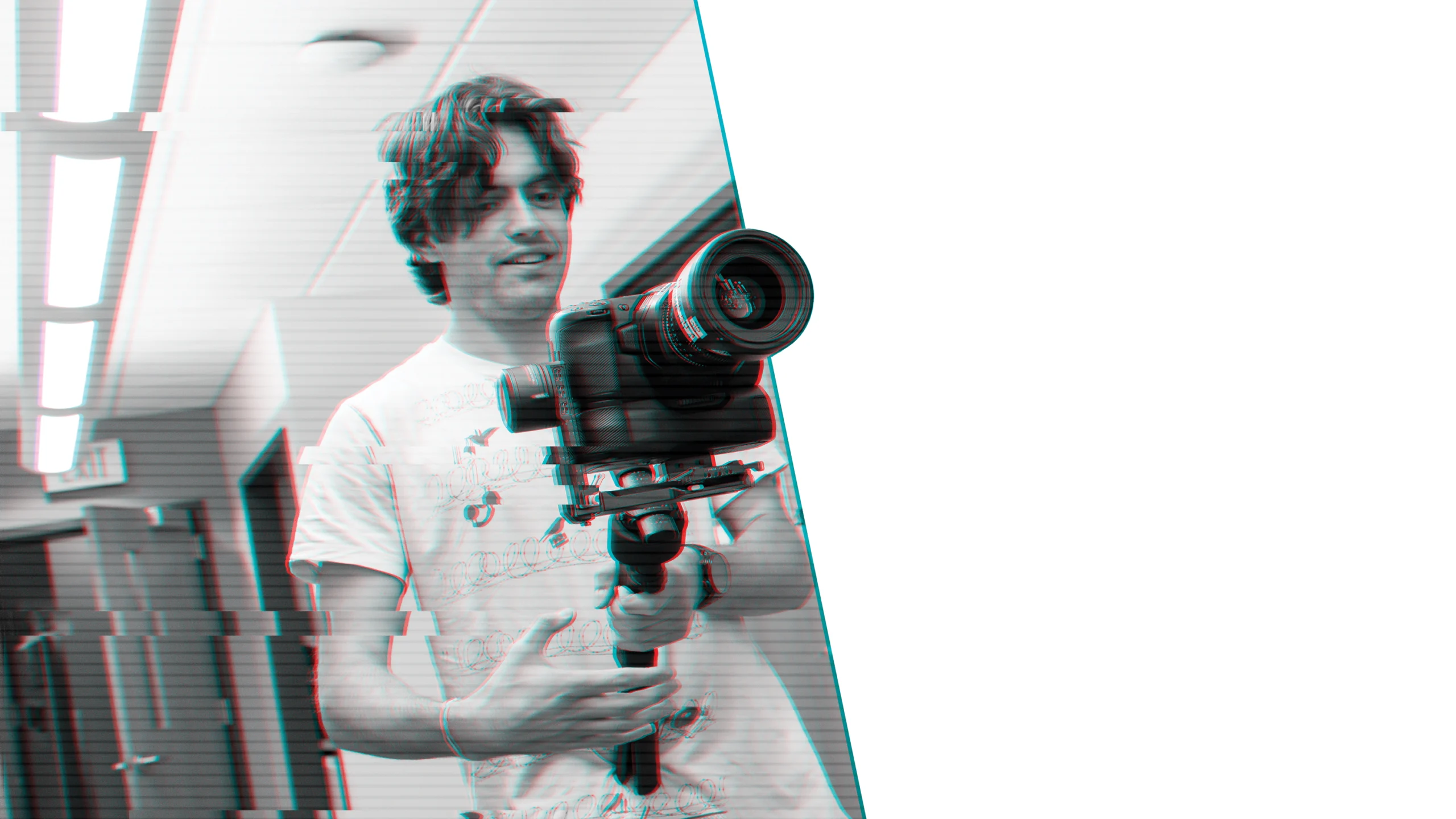
“Students get this broad
base in media and
communication that
allows them to get jobs in
whatever the field is on
the day they graduate.”
— Paul McEwan
Professor and Chair of Media & Communication
Kyle Tassone ’23 in Cinematography. Photo by Lisa Helfert

Hands-On Opportunities
Both inside and outside the classroom, media & communication students have ample opportunities to practice what they’re learning and expand their skill sets. Digital Cultures Media Assistant Tony Dalton is the keeper of the College’s media-making tools, which include a panoply of microphones, cameras, lenses and lighting equipment, and his philosophy is, “It’s playtime.”
“I absolutely don’t want our equipment sitting on the shelves,” Dalton says. “That’s why we have a broad policy that allows any media & communication or film studies student access to equipment day one. I want these toys played with — it’s the best way to learn and gain experience.”
The equipment is located in Walson Hall, the department’s home, which also includes a TV studio Dalton recently upgraded to “a cinema/broadcast hybrid, 4K, three-camera setup.” The studio doubles as a screening room for student work and a gathering space for departmental activities (movie nights, pop-up arcades and other events that draw students, faculty and staff). Walson’s editing studio features “super-powered Macs” that can handle native 6K, RAW, uncompressed video files, what Dalton calls “super duper borderline unnecessary quality video.” And Walson’s possibilities as a home for media
& communication will only grow — the department is set to take over the entire building in 2026.
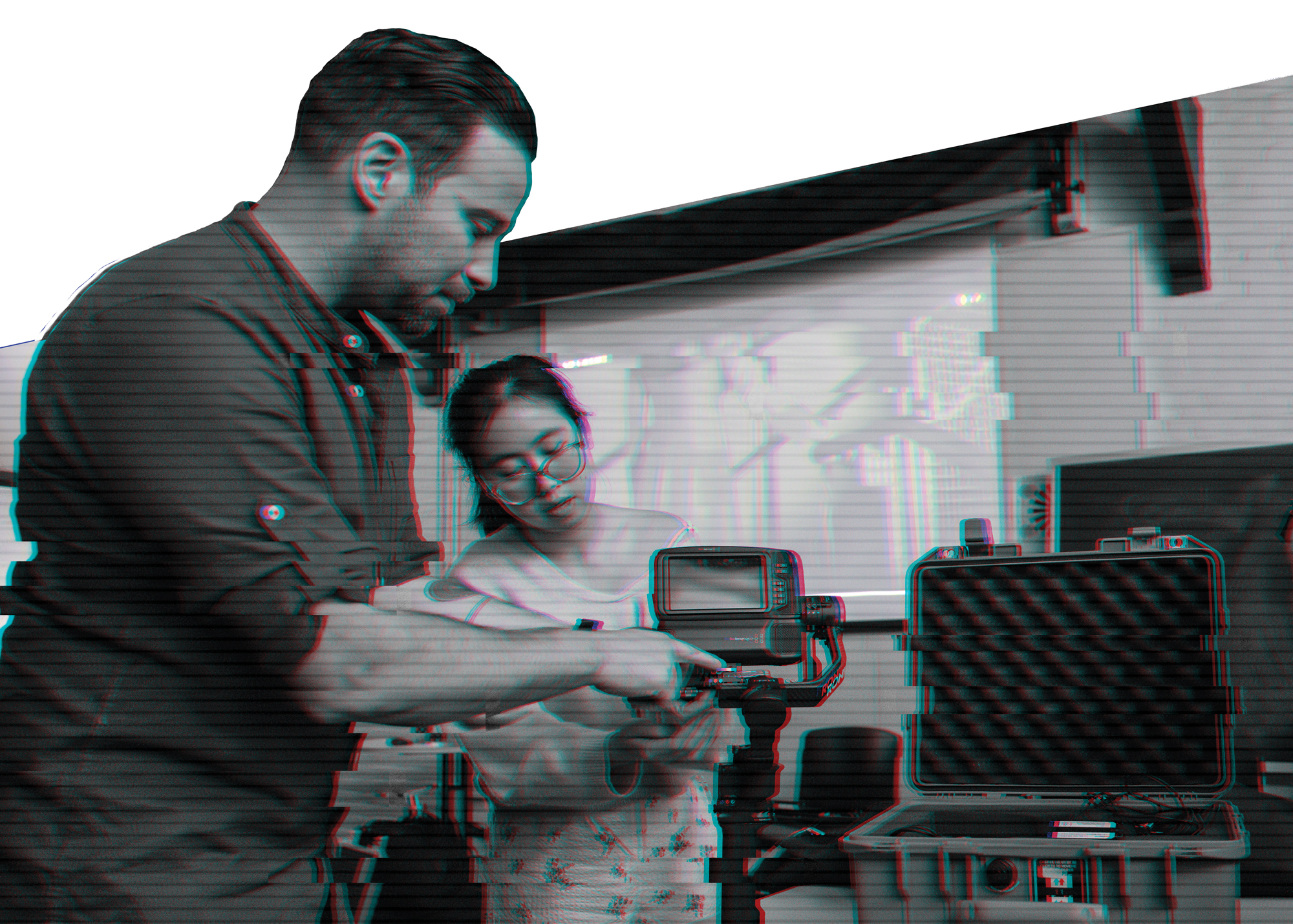
Two storied student organizations are among the extra-curricular opportunities that allow students to build their media-making skills. The College radio station, WMUH, turned 75 last year. Student DJs learn how to express themselves, speak on microphone, produce audio and present their music and themselves to an audience across the Lehigh Valley and, through online streaming, the world. Student leaders at WMUH build experience managing people, projects and organizations; sifting through new releases; and organizing and promoting events.
The College newspaper, The Muhlenberg Weekly, has been the official, student-run newspaper on campus since 1883. Students print 10 issues per semester; stories that break when an issue isn’t set to be published are covered online. Student writers and editors produce stories about campus news, arts and culture events and Muhlenberg sports. The Weekly provides an opportunity for students to become comfortable pitching ideas, interviewing campus community members, photographing events, organizing multiple sources of information into an article and putting their work out in the world. Weekly students can seek guidance from advisor Sara Vigneri, a lecturer of media & communication who has more than 20 years of experience as a reporter and fact-checker.
“I absolutely don’t want our equipment
sitting on the shelves … That’s why we have
a broad policy that allows any media &
communication or film studies student access
to equipment day one.”
— Tony Dalton,
Digital Cultures Media Assistant
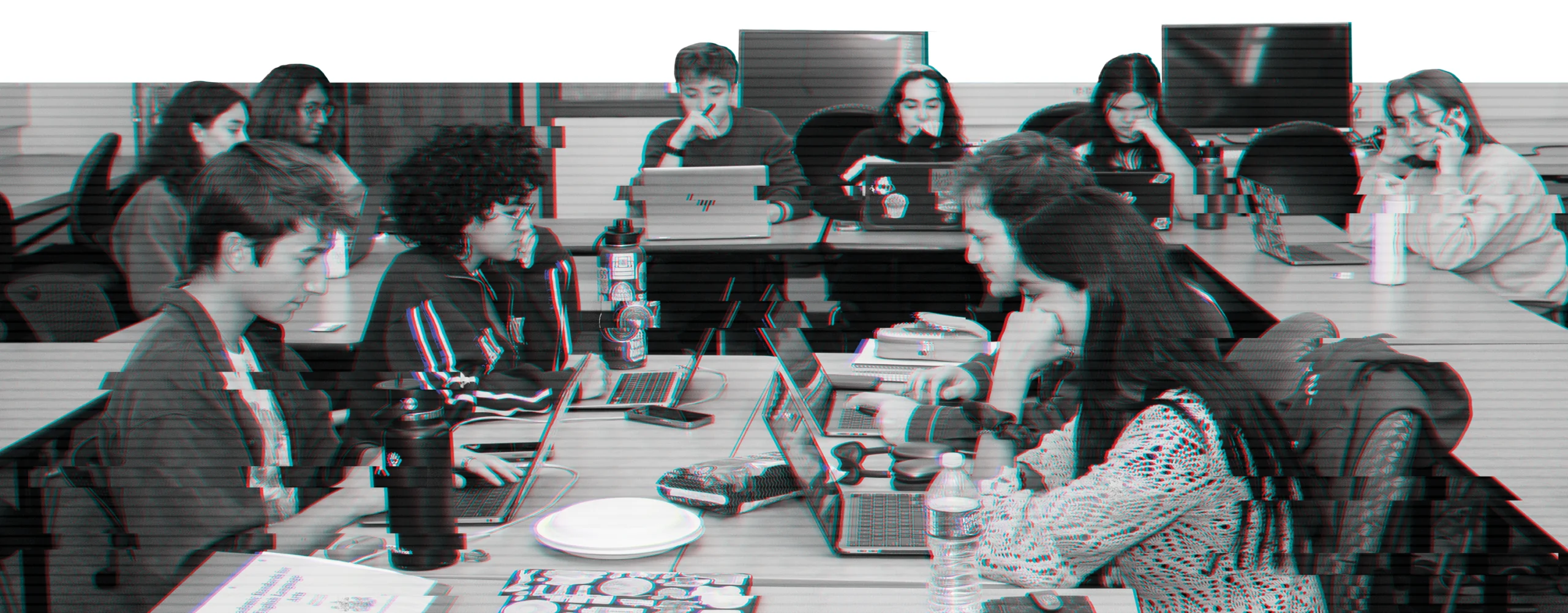
Students working on The Muhlenberg Weekly in October 2024. Photo by Sierra Addy ’27

A Signature Study Abroad Experience
Media & communication students who wanted to study abroad used to have limited options — a handful of abroad programs offered a communication course here and there, but there was a need for a better choice for the many Muhlenberg students in the major. In 2010, the department began to build a homegrown program modeled after the accounting, business, economics & finance program in the Netherlands, in which a Muhlenberg faculty member travels with the students and teaches a course in addition to the courses the students take at the host institution.
Because experiential learning is such a focus of media & communication, when the department set out to develop an abroad program, an internship had to be a key component.
That’s how Muhlenberg ended up partnering with Dublin City University (DCU), says Sullivan, the program’s founder: It was in the largest city of an English-speaking country where it wasn’t prohibitively difficult for foreign students to get internships, and DCU had the strongest communication program of all the Dublin institutions. Sullivan worked closely with the Office of Global Education, which helped coordinate a relationship with a company that matched students studying abroad with local internships.
“In hindsight, [starting this program] was a somewhat audacious undertaking given the complex logistics, the time investment of organizing the trip and mentoring students on their internship process and of course relying upon a steady commitment of one faculty member within our department to travel and teach there each spring semester,” Sullivan says. “It’s been a success, but that was not necessarily preordained at the outset.”
Each spring, about a dozen students travel to Dublin. Nine different faculty members have accompanied them over the years, some going more than once. Since the program’s launch in 2012, students have completed internships with record labels, magazines, nonprofits, video production companies, arts organizations, public relations firms and more.
“I was really excited about the program’s focus on media & communication as well as the opportunity to do an internship abroad,” says Marie Tohill ’25, a music and media & communication double major who studied in Dublin this spring. “My internship [at the nonprofit Cuala Foundation] focused on marketing for songwriters and musicians, and I realized how broad the definition of media & communication is. I walked away from my time in Ireland feeling that I could truly do anything with my major.”
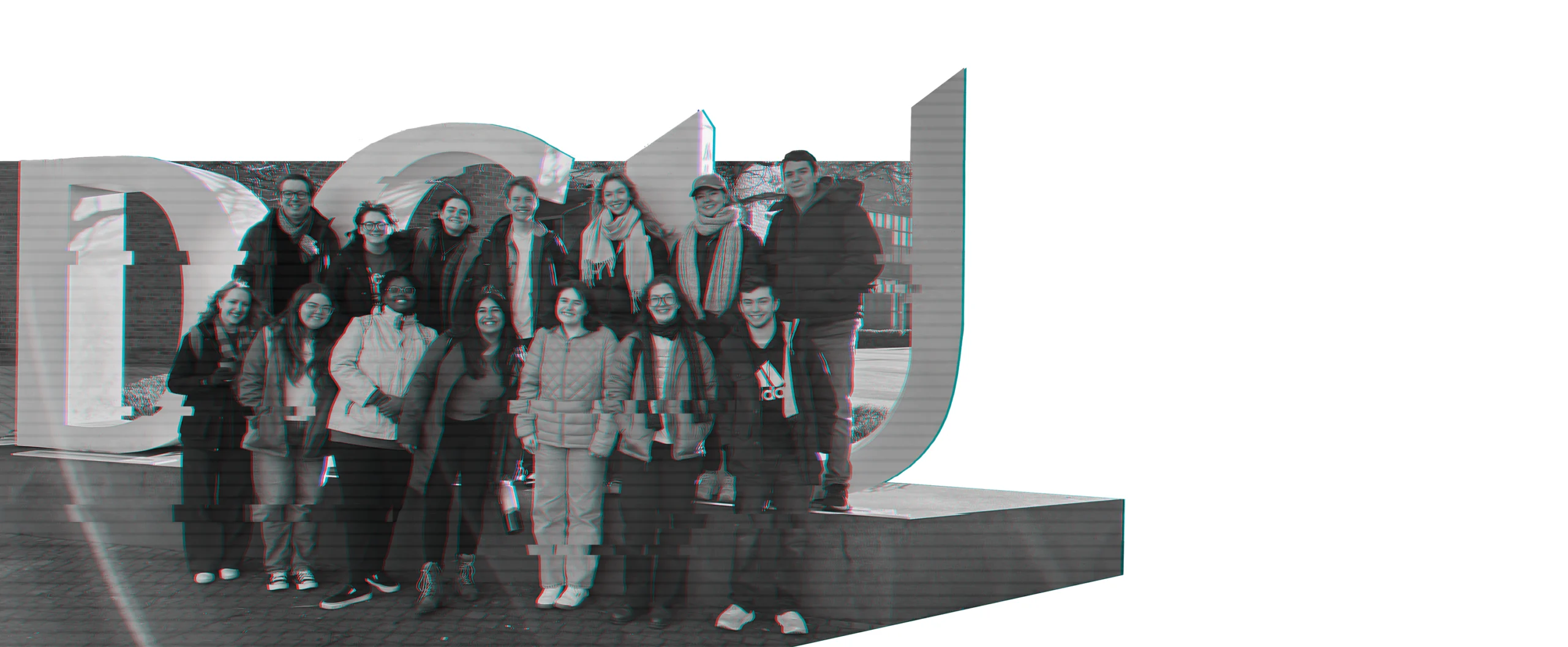
“I walked away
from my time
in Ireland feeling
that I could
truly do anything
with my [media &
communication] major.”
—Marie Tohill ’25,
Media & Communication
and Music Double Major
Professor and Chair of Media & Communication Paul McEwan (back left) with students in Dublin during the spring 2024 semester

Alumni Connections on Campus
Launching a career in media is often as much about who you know as what you know. That’s one reason why, in 2011, the Department of Media & Communication established Alumni Week, which invites graduates working in media back to campus for panels, classroom visits and networking opportunities. Professors of Media & Communication Sue Curry Jansen and Lora Taub worked with a group of alumni to come up with the idea and received substantial organizational help from Brian Meeley ’89, a public relations executive, in the early years. Alumni Week has proven to be so successful that Muhlenberg’s Career Center has worked to expand the concept beyond media & communication. Nearly 200 alumni have participated in the department’s Alumni Week over the years, some multiple times, and 46 alumni came to campus (in person or virtually) for the 2024 edition, which took place in March.
“Participants in Alumni Week cover a broad range of communication-related fields from electronic media, journalism, law, higher education, industry research and development, nonprofit agencies and activism, as well as public relations, marketing, lobbying, the music industry, sports media and much more. All of these fields are on the forefront of the digital revolution,” says Jansen, now a professor emerita. “Alumni Week panel presentations offer annual updates on the latest technological innovations and provide students with timely advice on seeking entry-level positions.”
One example of the power of Alumni Week is the story of Donald Adler ’15, who’s now a Webby Award-winning senior social content producer at Bravo and E! (part of NBCUniversal). As a first-year student, Adler, who wasn’t sure exactly where in media he wanted to land, attended an Alumni Week session with Brian Teta ’98, who was working as a producer on the Late Show with David Letterman.
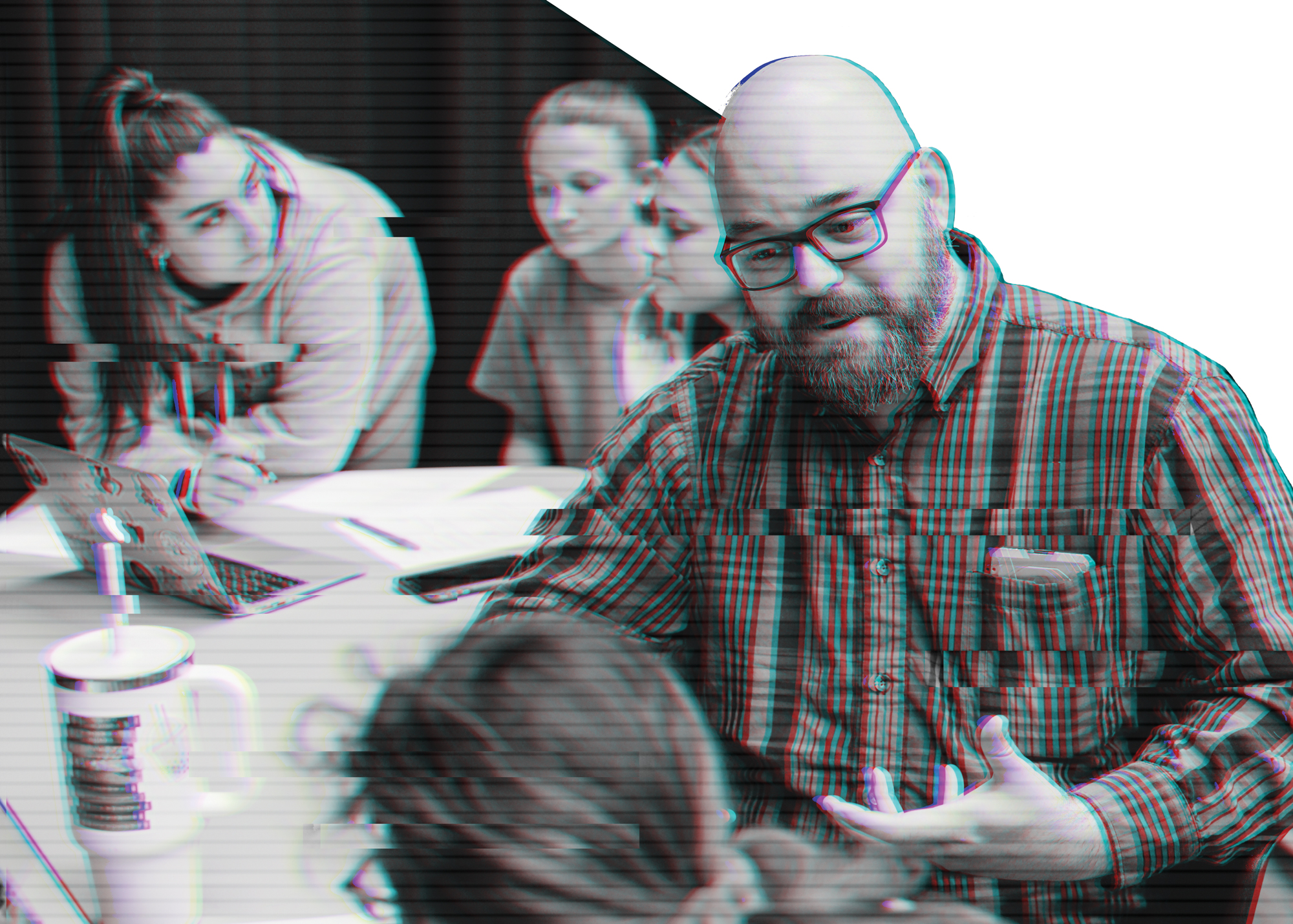
“I sat there in awe of what his life was, and how he came from the same school that I was at and he was a big producer in New York City on a late-night talk show,” Adler recalls. “I went up to him after that, and I just said, ‘I don’t know how to say this eloquently, but how do I become you?’”
That conversation kicked off a valuable mentoring relationship, one that helped Adler get his first television internship at the talk show Joy Behar: Say Anything! That experience led to other internships (including one on Late Show with David Letterman); those built experience that helped Adler land a spot in the competitive NBCUniversal Page Program, a rotational learning and development program that laid the groundwork for his hiring in his current role.
Listen to a more extensive interview on the alumni podcast 2400 Chew.
Of course, not all students are able to draw such a direct line between an Alumni Week experience and postgraduate success. Still, there is immense value in hearing the stories of alumni in media at all stages of their careers, especially how they navigated the years immediately following graduation.
“It can be a panic when you’re young, when you think everyone’s got a good job, and everyone’s telling you that your cousin got a great job at the bank or something like that, and almost nothing in media works like that,” McEwan says. “There are very, very few jobs where you get the job with the big corporation and work your way up. Almost everything is a freelance hustle at the beginning, or a lot of moving around, a lot of lateral movement. The more stories like that you hear, the more you understand how to do it and also the more you understand that when it happens to you, that’s what’s supposed to happen.”
HOW MUHLENBERG SHAPED ME
Three media & communication alumni share how their experience at the College led to successful careers after graduation.
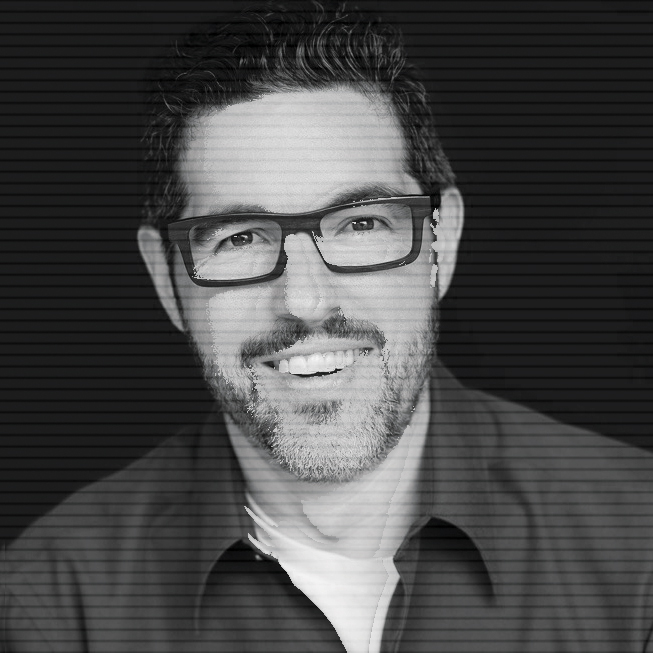
It didn’t just broaden my education, but my way of thinking. It was just a really well-rounded understanding of all things media. When you become a major in communication, you have whatever your aspirations are in mind, and you don’treally think about everything else that there is to it. And with the education I got, I really got to fully understand that ‘everything else there is to it.’”
—Dave Basner ’02 , Senior Vice President, Content Strategy at iHeartMedia
Listen to a more extensive interview on the alumni podcast 2400 Chew.
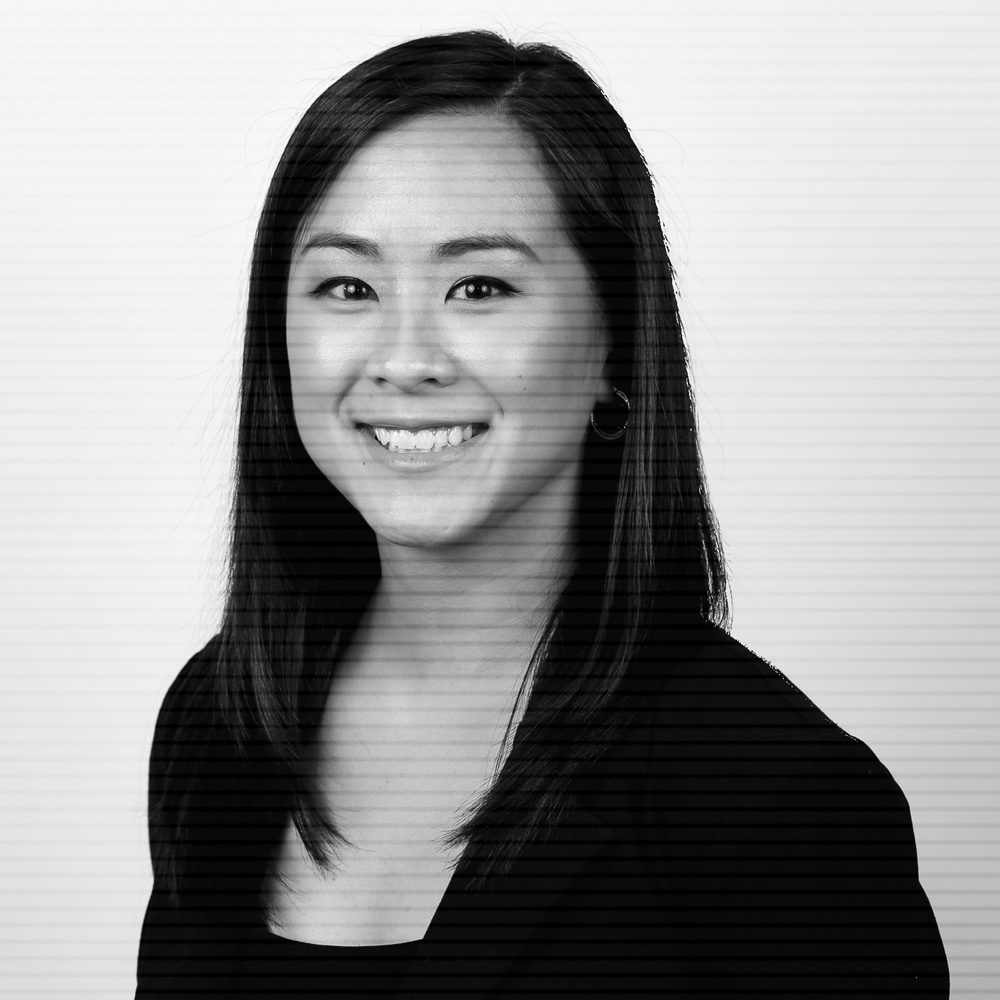
The biggest impact the Muhlenberg media & communication department made on me is the one-on-one attention and the support that they’ve given me while I was at school and throughout my career. A lot about television is hands-on work. They allowed me to create my own internship on campus. They got me in contact with a small production company in the area. They gave me the confidence that I can make it, and I will make it. And now that I have made it, they continue to support me and ask how I’m doing and invite me back for Alumni Week.”
—Amanda Wong ’14, Associate Producer for CBS Sports Golazo Network
Listen to a more extensive interview on the alumni podcast 2400 Chew.
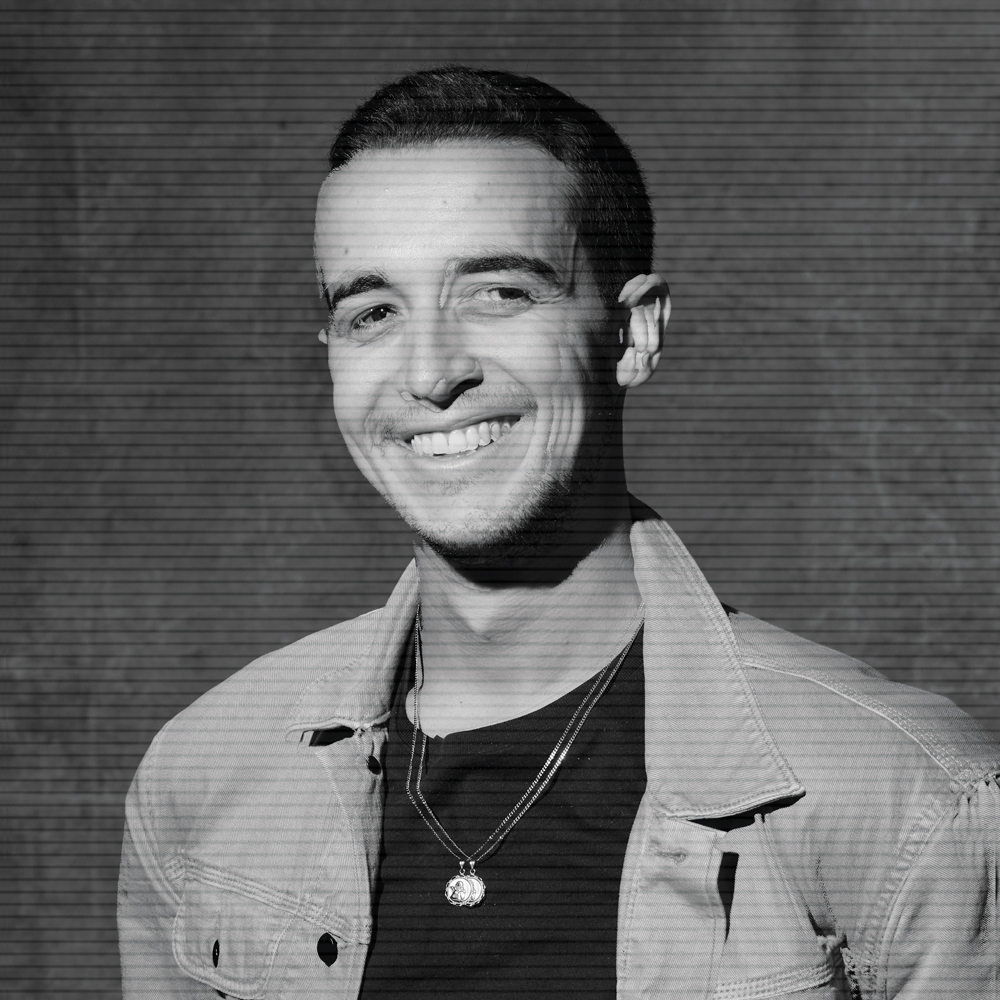
Something I say about Muhlenberg all the time is that the alumni network, especially in the media comm department, is 11 out of 10. I have friends [from other schools] who are looking for jobs now and no alumni from their schools are helping them. Any time I reached out to someone from Muhlenberg on LinkedIn, no matter what company they were at, almost all of them were willing to set aside 30 minutes just to chat. Whenever I come back to Muhlenberg to talk, one or two students will ask to have a 30-minute call. I will always say yes because I want to pay it forward.”
—Alberto Garrido ’21, Associate Campaign Manager at TelevisaUnivision
Listen to a more extensive interview on the alumni podcast 2400 Chew.

